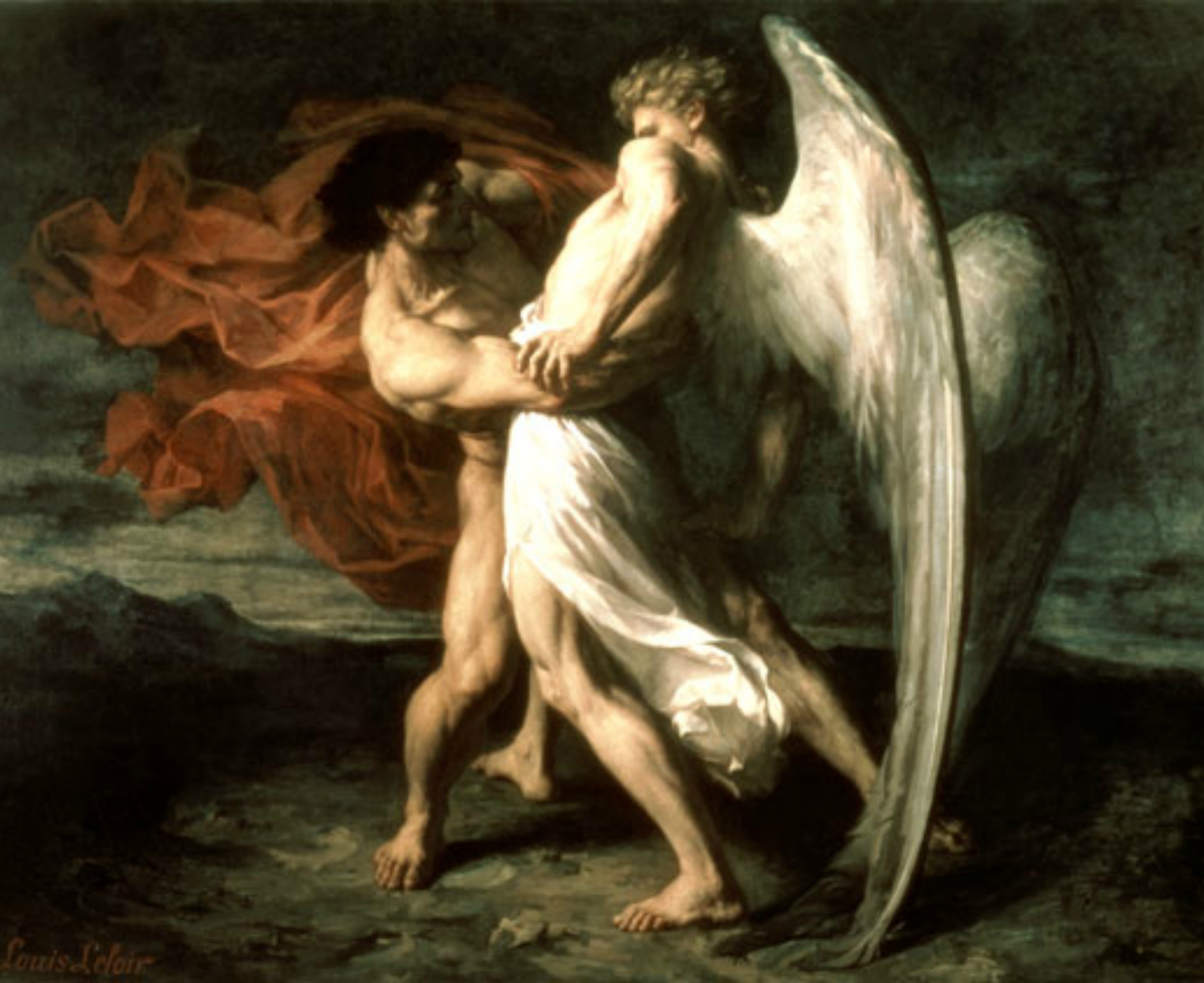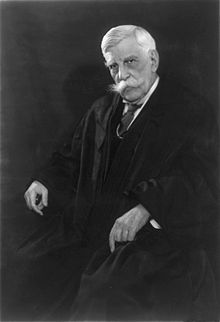
“A painting of Abraham’s departure” – which happened before “Abram” became “Abraham…”
* * * *
 I was reading the DORs for last Saturday morning – January 20, 2018 – starting with the Old Testament reading, Genesis 12:9-13:1.
I was reading the DORs for last Saturday morning – January 20, 2018 – starting with the Old Testament reading, Genesis 12:9-13:1.
It told about “Abram” – before he became Abraham – going down to Egypt “to reside there as an alien.” (Which raises whole ‘nother train of thought, vis-à-vis aliens in the Bible. And which explains why I put “Abraham” in quotation marks in the title. When he “pimped” he was still Abram.)
So anyway, “Abram” went down to Egypt to escape the famine – “severe in the land” – that was afflicting Shechem in Canaan. (“Shecem” was a village roughly 70 miles north of modern Jerusalem.) But Abram had a problem. His wife “Sarai” – before she became Sarah – was extremely beautiful. (As seen above left.) So here’s what he did:
As he was about to enter Egypt, he said to his wife Sarai, “I know what a beautiful woman you are. When the Egyptians see you, they will say, ‘This is his wife.’ Then they will kill me but will let you live. Say you are my sister [ – as illustrated below right – ] so that I will be treated well for your sake… And when Pharaoh’s officials saw her, they praised her to Pharaoh, and she was taken into his palace. He treated Abram well for her sake, and Abram acquired sheep and cattle, male and female donkeys, male and female servants, and camels.
 That’s according to Genesis 12:11-16. But then Pharaoh suffered a series of plagues or mishaps, and he finally figured out it was because Sarai was Abraham’s wife, not his sister. But somehow God turned that to Abram’s advantage, and so he left Egypt a much richer man than when he first arrived. (In much the same manner of the Children of Israel, as Moses led them out of Egypt after 400 years of slavery. See Exodus 3:22, “and ye shall spoil the Egyptians.”)
That’s according to Genesis 12:11-16. But then Pharaoh suffered a series of plagues or mishaps, and he finally figured out it was because Sarai was Abraham’s wife, not his sister. But somehow God turned that to Abram’s advantage, and so he left Egypt a much richer man than when he first arrived. (In much the same manner of the Children of Israel, as Moses led them out of Egypt after 400 years of slavery. See Exodus 3:22, “and ye shall spoil the Egyptians.”)
But Abram ended up a much richer man because he gave his wife to another man. So when I read that I thought, “Was Abram a pimp?” Then I wondered if I was the first person that thought had occurred to. (“To whom that thought had occurred,” to be grammatically correct.)
But no… I Googled “was abraham Bible a pimp,” and got 8,210,000 results. Most were from sites like Intelligent Blasphemy or The Heretic’s Bible. But aside from heretics and infidels, the same thought seems not to have occurred to many Christians. (Gee, I wonder why?)
But the question does bear consideration. And the answer I came up with is that many times you definitely don’t want to interpret the Bible too literally. And this is a prime example.
That is, if a “good Christian” takes the Bible too literally – and uses the plain meaning rule – the only logical conclusion is that Abram did indeed “pimp out his wife.” (Like the heretics and infidels say.) But that would miss the whole point of Abraham’s story. That story is not about Abraham pimping out his wife, any more than the Book of Jonah is about a stinkin’ whale!
 See On Jonah and the bra-burners (with the image at left):
See On Jonah and the bra-burners (with the image at left):
My point was that the “attention-getter” in Jonah – the whale – got in the way of the real message. So the Book of Jonah was just like the “bra-burners” at the 1968 Miss America pageant, where that real message got lost too. The real message of Jonah is: God’s love is universal… (It ain’t about no ^%$## whale!!!)
Thus the problem of using an attention-getter. (Like burning bras.) Sometimes it gets in the way of the real message. And so, “Ever since the Book of Jonah was written (it seems) Bible-readers have ‘picked up on the whale part.’ In doing so they’ve ignored the real message behind the book.” The same thing could happen here.
Maybe the real message of the Abraham saga is that he was a human ^%$# being, just like us today. He was not some “goody two-shoes” bent on preserving his “virtue.” And there’s another thing that Abraham was not. He was not a conservative. For example, notice that when God changed the names of both “Abram” and “Sarai” – to Abraham and Sarah – He expanded their horizons. (Just like it says at the top of this page.)
But imagine if Abram and Sarai had turned too conservative… For one thing, Abram would never have left Ur of the Chaldees. “I can’t do that! I’m too afraid of an unknown future!”
Also, note that the saga kind of concluded with this morning’s reading, Genesis 18:16-33. That’s where Abraham did another thing that “conservative Christians” would never think about doing. See On arguing with God. That post includes a section on Abraham “arguing:”
Take Sodom and Gomorrah… “Please!” That is, see: Genesis 18:16-33. That’s where Abraham pleaded with God not to destroy Sodom. (And quite frankly, he was kind of a pain about it, haggling with God not to destroy the city if there were 50 good people in it, down to as few as five good people…)
Anyway, the point of all this is that with a true Christian – a real Christian, not a too-conservative “Pharisee” – God changes people. And you won’t accept that change if you’re too conservative.
God changed Abram from an old man with no sons – from Sarai anyway – to Abraham, the “father of a multitude of nations.” God changed Sarai from a barren, childless old hag to Sarah, “the mother of the Church.” And God changed Jacob – who also wasn’t afraid to argue with God – to Israel, “Patriarchof the Israelites.” The lesson: Don’t be too conservative – too “literal” – in reading the Bible. Let God change you – for the better…
* * * *

“Jacob wrestling with the Angel” – as a result of which his name got changed to Israel…
* * * *
The upper image is courtesy of Abraham – Wikipedia. The full caption: “A painting of Abraham’s departure by József Molnár.”
The “Sarai” image is courtesy of tâniarubiminenglish.blogspot.com. (“Women in the Bible in real times,” and/orhttp://2.bp.blogspot.com/_W0RrCetBQQ0/TGoAWj…s1600/Bia49.jpg.” Or you can just Google “sarah Bible image.”
The image of Abraham counseling Sarai – “ Say you are my sister [ – as illustrated below right – ]” – is courtesy of Abraham – Wikipedia. The full caption: “‘Abram’s Counsel to Sarai’ (watercolor circa 1896–1902 by James Tissot).” Note that – according to the Bible (Genesis 17:17) – Abraham was ostensibly 10 years older than Sarah – but he looks much older in the picture.
Re: “Abram to Abraham.” See the Jamieson-Fausset-Brown Bible Commentary to Genesis 17:5:
In Eastern countries a change of name is an advertisement of some new circumstance in the history, rank, or religion of the individual who bears it. The change is made variously, by the old name being entirely dropped for the new, or by conjoining the new with the old; or sometimes only a few letters are inserted, so that the altered form may express the difference in the owner’s state or prospects.,, In dealing with Abraham and Sarai, God was pleased to adapt His procedure to the ideas and customs of the country and age. Instead of Abram, “a high father,” he was to be called Abraham, “father of a multitude of nations.”
See also Gill’s Exposition of the Entire Bible, which explained that at first “he was the father of Aram, and therefore his name was called Abram, but now he is the father of the whole world, and therefore called Abraham.” As for his wife’s change of name – from Sarai to Sarah – see Genesis 17:15: “God also said to Abraham, ‘As for Sarai your wife, you are no longer to call her Sarai; her name will be Sarah.'” The notes indicate that the name “Sarai signifies my princess, as if her honor were confined to one family only,” while the name “Sarah” indicates a change of status, from a “princess,” to something more. That is, “whereas formerly she was Abram’s princess only, she was henceforth to be recognized as a princess generally, i.e. as the mother of the Church.” So God expanded her horizons.
The full Satucket readings for Saturday, January 20, were: “AM Psalm 30, 32; PM Psalm 42, 43,” along with Genesis 12:9-13:1, Hebrews 7:18-28, and John 4:27-42. The full readings for Sunday, January 27, 2018, were: “AM Psalm 55; PM Psalm 138, 139:1-17(18-23); Genesis 18:1-16; Hebrews 10:26-39; and John 6:16-27. The Gospel reading included John 4:32, where Jesus said to His disciples – who had urged Him to eat – “I have food to eat that you do not know about.” That’s another indication that God didn’t intend the Bible to be taken too literally.
On that note, see also John 2:13-22, one of the recent Daily Office Readings:
The Jews then said to him, ‘What sign can you show us for doing this?’ Jesus answered them, ‘Destroy this temple, and in three days I will raise it up.’ The Jews then said, ‘This temple has been under construction for forty-six years, and will you raise it up in three days?’ But he was speaking of the temple of his body. After he was raised from the dead, his disciples remembered that he had said this; and they believed the scripture and the word that Jesus had spoken.
The point there is that in saying “destroy this temple,” Jesus didn’t mean to be taken literally, but figuratively. And that pretty much goes along with the major theme of this blog.
Re: Genesis 18:16-33. That’s where Abraham was a real pain to God:
Abraham came near and said, ‘Will you indeed sweep away the righteous with the wicked? Suppose there are fifty righteous within the city; will you then sweep away the place and not forgive it for the fifty righteous who are in it? Far be it from you to do such a thing, to slay the righteous with the wicked, so that the righteous fare as the wicked! Far be that from you! Shall not the Judge of all the earth do what is just?’ And the Lord said, ‘If I find at Sodom fifty righteous in the city, I will forgive the whole place for their sake.’ Abraham answered, ‘Let me take it upon myself to speak to the Lord, I who am but dust and ashes. Suppose five of the fifty righteous are lacking? Will you destroy the whole city for lack of five?’ And he said, ‘I will not destroy it if I find forty-five there.’ Again he spoke to him, ‘Suppose forty are found there.’ He answered, ‘For the sake of forty I will not do it.’ Then he said, ‘Oh do not let the Lord be angry if I speak. Suppose thirty are found there.’ He answered, ‘I will not do it, if I find thirty there.’ He said, ‘Let me take it upon myself to speak to the Lord. Suppose twenty are found there.’ He answered, ‘For the sake of twenty I will not destroy it.’ Then he said, ‘Oh do not let the Lord be angry if I speak just once more. Suppose ten are found there.’ He answered, ‘For the sake of ten I will not destroy it.’
The line – “Take Sodom and Gomorrah… ‘Please!’” – harks back to a classic Henny Youngman one liner. See Comedy Classics: Henny Youngman – “Take My Wife. Please.”
The lower image is courtesy of Wikipedia, is Jacob Wrestling with the Angel, by Alexander Louis Leloir(1865). Leloir (1843-1884), was a a French painter specializing in genre and history paintings. His younger brother was painter and playwright Maurice Leloir.

 It’s Wednesday, January 17, 2017, and
It’s Wednesday, January 17, 2017, and  In that he was not unlike Supreme Court justice
In that he was not unlike Supreme Court justice  Or as has been said before, the job of both reporters and real Christians is
Or as has been said before, the job of both reporters and real Christians is  For another look at the link between reporters and real Christians, see the original “
For another look at the link between reporters and real Christians, see the original “

 But back to the
But back to the  For more on the
For more on the 